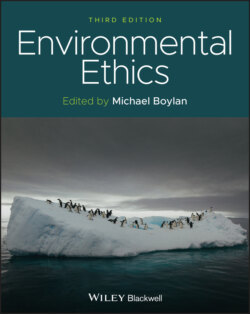Читать книгу Environmental Ethics - Группа авторов - Страница 34
Argument Three: The Priority of the Maker Over the Maker’s Output
ОглавлениеArgument Three has some interesting corollaries. Among these are that if we rank the priority normatively, from the vantage point of the thing made, the maker is (in an important sense) normatively good. This would make Nature (from the point of view of Humans and all other living things) good. In turn, if Nature is good and if technology created by Humans harms the operation of Nature, then that human technology is bad and ought not be adopted. This gradation of the evil is a function of how much harm Nature incurs.
Since the level of harm and the elasticity of Nature to rebound from temporary or ongoing harm is speculative at best, the principle of precautionary reason60 dictates that we should refrain from harming Nature whenever it is in our power to do so. It is one thing to see that such a corollary would apply in prohibiting air, water, and land pollution. This seems very straightforward. However, more difficult cases (beyond the scope of this chapter) are when one proffers technology that seeks to improve Nature. A pivotal example of this is in genetic engineering.61 If we try to improve the genome by the use of “knockout” gene strategies (that will affect future generations) for fatal genetic diseases or genetically-based handicaps, are we “helping” or “hurting” Nature? In the earlier terminology: is it kata phusin or para phusin? This a difficult question and may turn on other criteria such as the difference in somatic treatment versus germ line alterations. There are arguments that can be made on each side of this and related controversies. It is not the purpose of this chapter to solve these and other such important practical issues, but rather to offer a theoretical framework by which the discussion should proceed.
What we are left with in this second section of the chapter is a moral commitment to care for Nature. This moral commitment is based upon what Nature is (a series of concentric and overlapping human and Natural communities that are symbiotic). As humans, the study of Nature creates the value/duty relationship that outlines the ground of general moral duty from the human side. Then, this general ground becomes more practical when it is specified that there is a moral prohibition not to interfere in a harmful way with our human makings because Nature stands in relation to all of us as “maker.” As such, Nature’s makings (which includes us) requires the respect owed to a maker not to have its own artifacts come back to harm it. This second principle grounds our practical duties to Nature and acts as a firm moral limitation on human technology.
